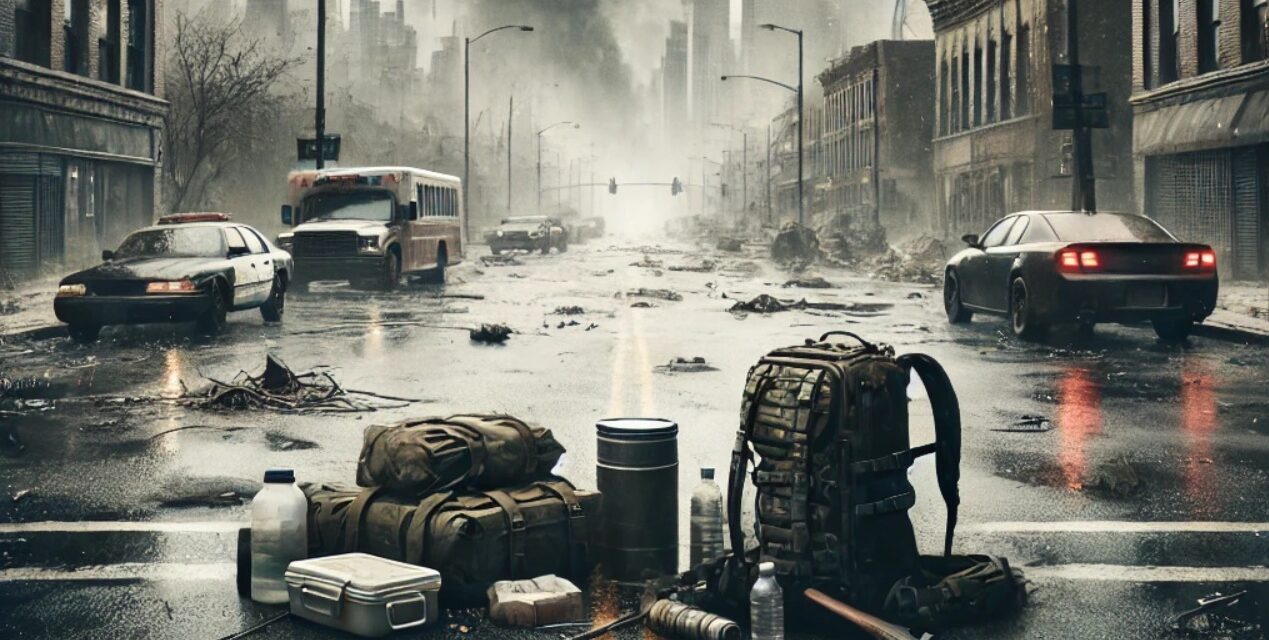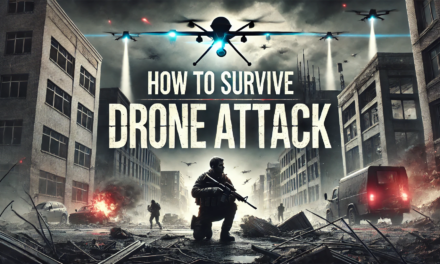TL;DR:
This guide helps you prepare for civil unrest in 2025. You’ll learn how to assemble emergency supplies, make a plan for a home emergency, and decide when to shelter in place. It walks through choosing essential gear, boosting situational awareness, staying calm under pressure, and taking proactive steps so you’re ready if things escalate.
Things appear to be reaching a boiling point. As Americans, we are more politically divided than ever. The recent assassination of Charlie Kirk could serve as a flashpoint for further escalation to come. This incident is well known because of Kirk’s fame, but far more shootings are happening and are buried in the news cycle. While no reasonable American WANTS a civil war, it makes sense to prepare for what may be inevitable.
America stands at a crossroads that our Founding Fathers feared most. Political divisions deepen daily. Constitutional rights face unprecedented assault. Government institutions weaponize against citizens who dare dissent. The specter of civil conflict—unthinkable just decades ago—now haunts serious Americans who understand that liberty requires eternal vigilance and, sometimes, ultimate sacrifice.
Understanding how to survive civil war isn’t about wishing for conflict or accelerating division. It’s about recognizing hard truths that mainstream media refuses to acknowledge while bureaucrats in Washington play dangerous games with the Republic’s foundations. When institutions fail, when dialogue becomes impossible, when fundamental disagreements about America’s future cannot be resolved through constitutional means, prepared citizens must know how to protect their families and preserve what remains of our constitutional heritage.
The question isn’t whether Americans might face internal conflict—it’s whether you’ll be ready when that terrible moment arrives.
Historical Context: What Would a Civil War Look Like Today
Quick Poll
Modern civil war in America would bear little resemblance to the 1861-1865 conflict between clearly defined geographical regions. Today’s divisions cut through neighborhoods, families, and institutions in ways that make traditional battle lines impossible to draw.
Decentralized Conflict: Modern American civil war would likely manifest as decentralized insurgency rather than conventional warfare. Think Northern Ireland’s “Troubles” or Ukraine’s early civil unrest, not Gettysburg’s massive formations. Small unit actions, sabotage, targeted assassinations, and economic warfare would characterize the conflict.
Urban vs. Rural Dynamics: America’s geographic divide between conservative rural areas and progressive urban centers creates unique challenges. Cities control economic centers but depend on rural areas for food, energy, and raw materials. Rural regions possess most of America’s military veterans, firearms, and survival skills but need urban manufacturing and financial systems.
Technology and Information Warfare: Any modern civil conflict would feature extensive cyber warfare, communication disruption, and information manipulation. Social media platforms would become battlegrounds for narrative control. Power grids, water systems, and communication networks would face constant attack from both sides.
Government Fragmentation: Unlike 1861, when state governments chose sides relatively cleanly, modern civil war would likely feature competing claims to legitimacy within single states. Conservative counties might reject progressive state governments while urban areas declare independence from conservative state control.
Understanding Civil War Triggers and Warning Signs
Smart Americans monitor political developments not as partisans but as threat assessments. Recognizing escalation patterns helps you prepare before violence erupts, not after your community becomes a battlefield.
Constitutional Crisis Indicators
Election Disputes: When significant portions of the population lose faith in electoral integrity, democratic resolution of differences becomes impossible. Watch for:
- Widespread claims of voter fraud or suppression
- State and federal governments reaching conflicting conclusions about election results
- Courts refusing to hear evidence or making obviously partisan decisions
- Military or law enforcement leadership making political statements
Institutional Weaponization: Government agencies targeting political opponents signals constitutional breakdown:
- Federal agencies investigating political dissidents for lawful activities
- Selective prosecution based on political affiliation
- Intelligence agencies spying on domestic political movements
- Military leadership expressing political preferences publicly
Economic Collapse Scenarios
Supply Chain Disruption: Modern America’s just-in-time economy creates vulnerability to civil conflict:
- Food distribution systems failing due to transportation blockades
- Energy infrastructure attacks causing rolling blackouts
- Financial system disruptions preventing electronic transactions
- Manufacturing shutdowns creating shortages of essential goods
Currency Debasement: Government monetary manipulation often precedes civil conflict:
- Rapid inflation destroying middle-class savings
- Government spending creating unsustainable debt loads
- Federal Reserve policies benefiting connected elites while impoverishing ordinary Americans
- States considering alternative currencies or barter systems
Social Fragmentation Warning Signs
Communication Breakdown: When Americans cannot discuss fundamental issues civilly, violence often follows:
- Social media platforms censoring legitimate political discourse
- Universities, workplaces, and communities punishing dissenting views
- Family relationships deteriorating over political differences
- Local communities dividing along ideological lines
Strategic Survival Planning: How to Prepare for Civil War

Preparing for civil war requires thinking beyond standard disaster preparedness. Civil conflicts create unique challenges that demand specialized planning and equipment.
Location Assessment and Relocation Considerations
Your survival odds depend heavily on your geographic location when conflict begins. Honest assessment might require difficult relocation decisions.
High-Risk Locations:
- Major metropolitan areas with dense populations and limited escape routes
- Government facilities and military installations likely to be targeted
- Critical infrastructure nodes (power plants, refineries, major transportation hubs)
- Areas with existing gang violence or criminal organizations
- Regions dependent on government employment or contractor spending
Strategic Advantages:
- Rural communities with agricultural production and water sources
- Areas with strong constitutional traditions and self-reliant populations
- Regions with difficult terrain that complicates large-scale military operations
- Communities with established networks of veterans and prepared citizens
- Locations with multiple escape routes and defensive advantages
Property Hardening and Defensive Preparation
Your home becomes a potential fortress or target depending on preparation and circumstances. Civil war survival skills include making your property less attractive to hostile forces while maintaining operational security.
Perimeter Security:
- Install quality locks, reinforced doors, and window protection
- Clear sight lines around your property to eliminate hiding spots
- Consider privacy fencing that obscures activities without appearing fortress-like
- Establish early warning systems (motion sensors, cameras, or alert neighbors)
- Create concealed observation points for monitoring approaches
Professional Shelter Solutions: Modern safe room technology offers unparalleled protection during civil unrest:
Swisher Safe Rooms: These reinforced concrete structures can withstand small arms fire and explosive devices. During civil conflict, a properly constructed safe room provides protection from home invasions, artillery fragments, and even chemical attacks.
Survive a Storm Shelters: While designed for tornado protection, these steel safe rooms offer excellent ballistic protection when properly installed. Their modular design allows installation in existing homes without major construction.
Advanced Supply Strategies
Civil war preparation requires supplies far beyond standard emergency kits. Extended conflict creates shortages that last months or years, not days or weeks.
Extended Food Storage:
- Calculate one year’s worth of food minimum per person
- Focus on calorie-dense foods requiring minimal preparation
- Store foods that can trade for other necessities (coffee, alcohol, tobacco, chocolate)
- Maintain seed stocks and basic gardening equipment for food production
- Learn food preservation techniques (canning, smoking, dehydration)
Click here to get the full 1-Year Emergency Food Supply — the ultimate hedge against chaos.
Need a smaller option? Browse the full emergency food collection here.
Water Security:
- Identify multiple water sources beyond municipal systems
- Install hand pumps for wells or rainwater collection systems
- Stock industrial-grade water purification systems and filters
- Maintain chemical purification tablets and UV sterilization equipment
- Consider backup power for electric water pumps

Medical Preparations: Civil conflict creates massive medical challenges while disrupting normal healthcare systems:
- Stock prescription medications for 6-12 months minimum
- Learn combat first aid including trauma care and wound management
- Obtain antibiotics, pain medications, and surgical supplies where legally possible
- Establish relationships with medical professionals who share your values
- Consider veterinary medical supplies which often contain identical medications
Protection Equipment: MIRA Safety Equipment: Their gas masks and protective suits provide defense against chemical weapons, industrial accidents, and biological hazards that often accompany civil conflicts. Their equipment meets military specifications while remaining available to civilians.
Communication and Intelligence Networks
Information superiority often determines survival during civil conflicts. Establishing reliable communication networks keeps you informed while maintaining operational security.
Primary Communication Systems:
- Ham radio equipment for long-distance communication
- FRS/GMRS radios for local coordination with neighbors
- Satellite communication devices for emergency contact with distant family
- Secure messaging applications that function without cellular networks
- Dead drop systems for passing information without direct contact
Intelligence Gathering:
- Monitor multiple news sources while recognizing bias
- Establish contacts in law enforcement, military, and government
- Participate in community groups to understand local dynamics
- Track economic indicators that predict conflict escalation
- Maintain situational awareness of transportation routes and supply lines
Immediate Survival Tactics: What to Do When Civil War Breaks Out
When civil conflict erupts, your first 72 hours often determine whether you survive or become a casualty. Quick decision-making and immediate action plans can mean the difference between safety and disaster.
Rapid Assessment and Decision Making
Information Gathering: When reports of civil conflict begin, immediately:
- Contact trusted sources in law enforcement, military, or government
- Monitor multiple news sources while filtering obvious propaganda
- Check with family members and close friends about their situation and plans
- Assess local conditions through direct observation and neighbor contacts
- Determine whether conflict is localized or spreading nationally
Go/No-Go Decision: You have roughly 4-6 hours to decide whether to shelter in place or evacuate before roads become impassable. Base this decision on:
- Proximity to likely targets (government buildings, military facilities, infrastructure)
- Local population density and ethnic/political tensions
- Available escape routes and their current condition
- Family member locations and ability to reach them
- Supply levels and defensive preparations at your current location
Immediate Action Plans
If Staying:
- Secure all entrances and windows immediately
- Position defensive supplies and communication equipment
- Establish contact schedules with trusted neighbors
- Begin water collection and food rationing protocols
- Set up observation posts to monitor approaching threats
If Evacuating:
- Grab pre-positioned go-bags and essential documents
- Load vehicles with maximum fuel and supplies
- Contact family members with departure time and destination
- Destroy sensitive documents and computers that reveal personal information
- Leave quickly using predetermined routes, avoiding major highways
Movement and Transportation Security
Civil war survival often requires movement through hostile territory. Whether evacuating initially or moving for supplies later, understanding movement security prevents ambushes and checkpoints from becoming death traps.
Vehicle Preparation:

- Maintain multiple escape routes plotted on paper maps
- Keep vehicles fueled and mechanically sound at all times
- Install run-flat tires or tire repair kits for emergency situations
- Carry basic tools, spare parts, and extra fuel in approved containers
- Remove or cover items that identify political affiliations or valuable contents
Convoy Operations:
- Travel in groups of 2-3 vehicles maximum to avoid appearing threatening
- Maintain radio contact between vehicles using predetermined frequencies
- Establish lead and follow responsibilities for navigation and security
- Plan stopping points and rally locations in case of separation
- Carry emergency signals for identifying friendly forces
Long-Term Survival: Civil War Preparation for Extended Conflict
Modern civil wars typically last 3-7 years, requiring sustained preparation beyond initial survival. Building long-term resilience determines whether you merely survive or actually thrive during extended conflict.
Community Building and Alliance Formation
Neighborhood Defense Networks: Individual families cannot survive extended civil conflict alone. Building trusted community networks before crisis creates survival advantages:
- Identify neighbors with military, law enforcement, or medical backgrounds
- Organize informal meetings to discuss security concerns and mutual aid
- Establish communication protocols and rally points for emergencies
- Pool resources for major purchases (generators, medical equipment, communications gear)
- Cross-train in essential skills (medical, mechanical, agricultural, communications)
Operational Security (OPSEC):
- Limit knowledge of your preparations to absolutely trusted individuals
- Use code words and indirect communication when discussing sensitive topics
- Vary routines and patterns to prevent surveillance
- Compartmentalize information so no single person knows all your capabilities
- Document nothing that could compromise your family if discovered
Sustainable Resource Management
Food Production:
- Convert ornamental landscaping to food production immediately
- Start composting systems for soil improvement and waste reduction
- Raise small livestock (chickens, rabbits) that produce food efficiently
- Learn foraging and hunting skills for supplementing stored food
- Establish seed-saving practices to maintain food independence
Energy Independence:
- Install solar panels with battery storage systems
- Acquire manual tools that don’t require electricity
- Learn alternative cooking methods (wood, propane, solar)
- Stockpile fuel for heating and transportation
- Develop muscle-powered alternatives for essential activities
Economic Preparation: Civil conflicts destroy normal economic systems, requiring alternative exchange methods:
- Maintain physical precious metals for wealth preservation
- Stock trade goods (ammunition, medical supplies, tools, alcohol)
- Learn valuable skills that others will pay for (medical, mechanical, agricultural)
- Establish relationships with producers of essential goods
- Develop barter networks with trusted community members
Psychological Warfare and Mental Preparedness
Civil wars attack minds as much as bodies. Understanding psychological warfare tactics and maintaining mental resilience prevents demoralization that leads to poor decisions or surrender.
Information Warfare Defense
Propaganda Recognition:
- Understand that both sides will lie extensively to maintain support
- Verify information through multiple independent sources
- Recognize emotional manipulation techniques designed to generate hatred
- Maintain relationships with people on different sides to understand various perspectives
- Focus on protecting your family rather than winning ideological arguments
Stress Management: Extended conflict creates cumulative stress that affects decision-making and health:
- Maintain physical fitness routines to manage stress and stay combat-ready
- Practice meditation or prayer to maintain mental clarity
- Rotate guard duties and responsibilities to prevent burnout
- Plan recreational activities to maintain morale during long conflicts
- Address PTSD symptoms before they become debilitating
Family Unity and Leadership
Children’s Preparation:
- Teach children basic survival skills appropriate to their age
- Explain situations honestly without creating unnecessary fear
- Maintain educational activities to preserve normalcy and hope
- Include children in age-appropriate security and preparation activities
- Plan for protecting children’s innocence while preparing them for reality
Leadership Roles:
- Establish clear authority structures for family and community decisions
- Cross-train family members in essential leadership skills
- Plan succession in case primary leaders become casualties
- Maintain discipline and standards even under extreme stress
- Balance authoritarian efficiency with democratic legitimacy
What to Do If a Civil War Breaks Out in 2025
Current political tensions suggest that civil conflict could erupt with little warning during major political events. Understanding likely triggers helps you position for maximum survival advantage.
Election-Related Scenarios
Disputed Election Results: If the 2024 election results face widespread challenges:
- Begin final preparations immediately when disputes become serious
- Avoid large gatherings or political demonstrations that could turn violent
- Monitor state government responses to federal election certifications
- Position family members away from state capitals and federal facilities
- Implement communication plans before cell networks become unreliable
Federal vs. State Confrontations: If state governments defy federal authority or vice versa:
- Determine which authority controls local law enforcement and military units
- Prepare for supply disruptions as different authorities control different infrastructure
- Avoid areas where competing authorities might clash directly
- Plan evacuation routes that don’t cross jurisdictional boundaries
- Stockpile cash as banking systems may become unreliable
Economic Collapse Triggers
Currency Crisis: If the dollar faces hyperinflation or foreign rejection:
- Convert savings to physical goods, land, or precious metals immediately
- Stockpile goods for trade before prices become prohibitive
- Establish local barter networks with neighbors and nearby communities
- Prepare for supply disruptions as international trade collapses
- Plan for utility disruptions as infrastrfucture funding disappears
Legal and Ethical Considerations
Understanding legal frameworks during civil conflict helps you avoid prosecution while maintaining moral authority for your actions.
Self-Defense Rights
Castle Doctrine and Stand Your Ground:
- Know your state’s self-defense laws thoroughly before conflict begins
- Understand when deadly force is legally justified
- Document threats and attacks to establish legal justification
- Maintain weapons training and safety protocols to prevent accidents
- Consider legal representation for post-conflict prosecutions
Rules of Engagement:
- Establish clear rules for when family members may use force
- Distinguish between legitimate military targets and non-combatants
- Understand Geneva Convention principles even during civil conflict
- Maintain moral standards to preserve post-conflict legitimacy
- Document war crimes committed by any side for eventual prosecution
Constitutional Preservation
Maintaining American Principles: Even during civil conflict, preserve constitutional values that make America worth defending:
- Protect free speech and religious liberty within your community
- Maintain due process for resolving disputes and administering justice
- Respect private property rights and rule of law
- Protect non-combatants regardless of their political affiliation
- Plan for eventual reconciliation and restoration of constitutional government
The Arsenal of Freedom: Defending Constitutional Liberty
Civil war survival ultimately means preserving the constitutional republic our ancestors bequeathed to us. This requires understanding what we’re fighting for, not just what we’re fighting against.
The Founders understood that liberty requires eternal vigilance. They recognized that governments derive their just powers from the consent of the governed, and that when governments become destructive of those ends, it is the right of the people to alter or abolish them. They also understood the terrible costs of such action and the sacred duty to pursue peaceful remedies before resorting to force.
Modern Americans face challenges the Founders couldn’t have imagined, but the principles they established remain our surest guide. Civil war preparation isn’t about destroying America—it’s about preserving the constitutional republic against those who would fundamentally transform it into something our ancestors wouldn’t recognize.
How to prepare for a civil war means preparing to be worthy inheritors of American liberty. It means developing the skills, knowledge, and moral character necessary to preserve constitutional government for future generations. It means understanding that freedom isn’t free and that each generation must earn anew the blessings of liberty.
The American experiment in self-government faces its greatest test since 1861. Unlike that conflict, which was fundamentally about extending constitutional principles to all Americans, today’s divisions challenge the principles themselves. Some Americans want to preserve the constitutional republic of limited government, individual rights, and federalism. Others seek to transform America into a centralized administrative state that prioritizes collective outcomes over individual liberty.
These differences cannot be resolved through normal political processes when one side no longer accepts constitutional limits on government power. When institutions become weaponized, when elections become meaningless, when constitutional rights become conditional privileges, prepared Americans must be ready to defend what remains of the Republic.
This preparation requires more than stockpiling supplies or learning tactical skills. It requires understanding American history, constitutional principles, and the moral framework that justifies resistance to tyranny. It requires building communities of like-minded Americans who can preserve constitutional culture through the dark times ahead.
Most importantly, it requires hope. The American people have faced civil war before and emerged stronger. We’ve faced foreign invasions, economic collapse, and internal subversion while maintaining our commitment to constitutional liberty. The challenges ahead are severe, but they’re not insurmountable for a people who understand what they’re fighting for and possess the tools to defend it.
Your family is counting on you to understand these times and prepare accordingly. Your community needs citizens who can lead when institutions fail. America needs inheritors who understand that the price of liberty is eternal vigilance, and sometimes, ultimate sacrifice.
Be that American. Be ready. Be worthy of the inheritance you’ve received and the legacy you’ll leave.
Essential Gear for Surviving a Civil War in 2024/2025
Preparing for a potential civil war requires more than just strategies and plans; it demands access to reliable tools and resources that ensure safety, sustenance, and resilience. From generating power to securing food and water, having the right gear can significantly increase your chances of survival during prolonged instability. Below is a carefully selected list of essential products that every American patriot should consider to stay prepared for the challenges ahead.
Patriot Power Generator 2000X
The Patriot Power Generator 2000X is a robust solution for ensuring uninterrupted power during uncertain times. Its powerful battery capacity and advanced solar panel integration make it an invaluable tool for keeping your essential appliances running. The generator comes with 14 free gifts, including a 100-Watt solar panel and a grab-and-go cart, adding tremendous value to its already stellar features. A free training session with preparedness expert Seth Weller ensures you’ll learn how to maximize its power and tailor it to your specific needs, making it a cornerstone of any survival plan. This generator is quiet, emission-free, and designed for portability, making it ideal for both home use and bug-out scenarios. Whether it’s keeping your refrigerator operational or powering medical devices, the Patriot Power Generator 2000X provides reliable energy when you need it most.
Grid Doctor 3300 Solar Generator
When it comes to powering heavy-duty appliances, the Grid Doctor 3300 Solar Generator is a game-changer. With a 50% more powerful inverter than many competitors, this generator can handle full-sized refrigerators, space heaters, and even heavy-duty tools. Its ability to run multiple appliances simultaneously ensures your household can maintain normalcy even during prolonged outages. The Grid Doctor 3300 also boasts innovative features like Maximum Power Point Tracking (MPPT) and uninterrupted power supply (UPS) protection. With 15 charging ports and compatibility with expansion batteries for extended run times, this generator is built to keep you self-sufficient through the toughest challenges.
Grid Doctor 300 Portable Generator
For those on the move, the Grid Doctor 300 Portable Generator offers unparalleled portability without sacrificing power. Weighing only 8 pounds, it’s light enough to carry in one hand but powerful enough to charge small appliances, lights, and even medical equipment. With its stackable design, intuitive display, and UPS functionality, it’s a versatile choice for bug-out bags or temporary shelters. This generator is ideal for powering essential devices during short-term emergencies or while traveling, providing peace of mind in any situation.
Alexapure Pro Water Filtration System
Water is a non-negotiable resource for survival, and the Alexapure Pro Water Filtration System guarantees access to clean, drinkable water from virtually any source. Its gravity-powered filtration removes over 200 contaminants, including bacteria, heavy metals, and viruses, ensuring your family’s safety. With a filtration capacity of 200 gallons and a durable stainless-steel design, the Alexapure Pro is built to last. Its ease of use and portability make it a must-have for both home and mobile use during a crisis.
VESTA Self-Powered Indoor Space Heater & Stove
The VESTA Self-Powered Indoor Space Heater & Stove is a versatile tool that ensures warmth and nourishment during extreme conditions. This compact device can heat up to 200 square feet and double as a stove, allowing you to cook meals indoors safely. Powered by InstaFire canned heat, it’s lightweight and portable, making it perfect for bug-out scenarios. With its ability to operate without electricity, the VESTA is an indispensable resource for staying warm and well-fed during power outages or cold weather crises.
Having the right tools and resources is critical for surviving a civil war or any extended period of unrest. These products not only address basic needs but also provide a foundation for self-reliance and resilience, ensuring you’re prepared for whatever challenges come your way.
Tactistaff Survival Stick
When the world collapses and you’re forced into the wild, the Tactistaff Survival Stick is not a luxury—it’s a lifeline. In the chaos of a civil war, where every second counts and every tool matters, this multi-functional survival stick is your ultimate companion. Known as the “Swiss Army Multi-functional Tactical Survival Stick,” it’s packed with critical tools for life-or-death situations: a magnetic compass to navigate treacherous terrain, a fire starter to fend off the deadly cold, an emergency whistle to call for help, and a harpoon and knife for hunting or self-defense. This isn’t just gear—it’s survival.
Built from machined aluminum alloy 6061-T6, the Tactistaff is virtually indestructible, capable of withstanding immense pressure and supporting your full weight if needed. Its extendable design, reaching up to 54.4 inches, adapts to any crisis, whether you’re scaling rugged landscapes or defending yourself against threats. When the comforts of civilization vanish, this survival stick becomes your best chance at enduring the elements, securing food, and staying alive. In a world gone dark, the Tactistaff ensures you’ll always have an edge.
Conclusion: Surviving as an American Patriot During a Civil War
While the thought of a civil war may seem daunting, it is important for American patriots to be prepared for any potential challenges that may come their way. By stocking up on supplies, creating a safety plan, staying informed but wary of misinformation, maintaining physical fitness, being mindful of surroundings, staying connected with like-minded individuals, and remaining calm and rational, you can increase your chances of surviving during a civil war in 2024/2025. Remember to always prioritize safety and take necessary precautions as tensions continue to rise in our country. Stay vigilant and stay strong – we will get through this together as patriotic Americans.





